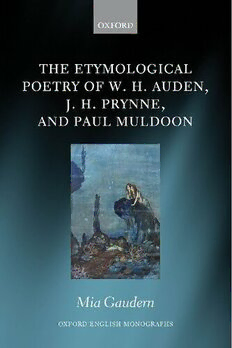
The Etymological Poetry of W. H. Auden, J. H. Prynne, and Paul Muldoon PDF
Preview The Etymological Poetry of W. H. Auden, J. H. Prynne, and Paul Muldoon
OUPCORRECTEDAUTOPAGEPROOFS–FINAL,3/6/2020,SPi OXFORD ENGLISH MONOGRAPHS GeneralEditors ’ OUPCORRECTEDAUTOPAGEPROOFS–FINAL,3/6/2020,SPi OUPCORRECTEDAUTOPAGEPROOFS–FINAL,3/6/2020,SPi The Etymological Poetry of W. H. Auden, J. H. Prynne, and Paul Muldoon MIA GAUDERN 1 OUPCORRECTEDAUTOPAGEPROOFS–FINAL,3/6/2020,SPi 3 GreatClarendonStreet,Oxford,OX26DP, UnitedKingdom OxfordUniversityPressisadepartmentoftheUniversityofOxford. ItfurtherstheUniversity’sobjectiveofexcellenceinresearch,scholarship, andeducationbypublishingworldwide.Oxfordisaregisteredtrademarkof OxfordUniversityPressintheUKandincertainothercountries ©MiaGaudern2020 Themoralrightsoftheauthorhavebeenasserted FirstEditionpublishedin2020 Impression:1 Allrightsreserved.Nopartofthispublicationmaybereproduced,storedin aretrievalsystem,ortransmitted,inanyformorbyanymeans,withoutthe priorpermissioninwritingofOxfordUniversityPress,orasexpresslypermitted bylaw,bylicenceorundertermsagreedwiththeappropriatereprographics rightsorganization.Enquiriesconcerningreproductionoutsidethescopeofthe aboveshouldbesenttotheRightsDepartment,OxfordUniversityPress,atthe addressabove Youmustnotcirculatethisworkinanyotherform andyoumustimposethissameconditiononanyacquirer PublishedintheUnitedStatesofAmericabyOxfordUniversityPress 198MadisonAvenue,NewYork,NY10016,UnitedStatesofAmerica BritishLibraryCataloguinginPublicationData Dataavailable LibraryofCongressControlNumber:2019957797 ISBN 978–0–19–885045–8 Printedandboundby CPIGroup(UK)Ltd,Croydon,CR04YY LinkstothirdpartywebsitesareprovidedbyOxfordingoodfaithand forinformationonly.Oxforddisclaimsanyresponsibilityforthematerials containedinanythirdpartywebsitereferencedinthiswork. OUPCORRECTEDAUTOPAGEPROOFS–FINAL,3/6/2020,SPi Preface ‘Who knew forensic derives from forum?’ asks Muldoon in a recent poem, providing an answer to one riddle and in the process obliquely presenting us withanother:whatexactlyisitthatweknow,nowthattheetymologicalconnec- tionbetween‘forensic’and‘forum’hasbeenrevealed?Ithasbeensuggestedthat all poetic language is a kind of etymologising, since it invites us to interpret physical similarities between words as meaningful. Jakobson called this ‘poetic etymology’,ametaphorthatbearscomparisonwithEmerson’swell-knownaph- orismthat‘languageisfossilpoetry’.Thisbookseekstounderstandwhathappens when these two concepts are broughttogether, in what isdefined asthe ‘etymo- logicalpoetry’ofW.H.Auden,J.H.Prynne,andPaulMuldoon. Etymological poetry is alive to the past lives of its words, and it probes the possible significance of them both explicitly and implicitly. This is rarely an uncontentious method; however resonant the result may be, critics warn that it shows the poet’s natural interest in language degenerating into an unhealthy obsession with the dictionary. Between Muldoon’s provocative bravura, Prynne’s famed impenetrability, and Auden’s ‘lexical exercises’, etymological concerns contribute an element of linguistic pedantry to a poetry that is already ‘difficult’.Itisunavoidablypedantic, inthepost-Saussureanera,toentertainthe idea that a word’s history might have any relevance to its current use. This is wheretheforensicandtheforumintersect—touseaspatialmetaphorforwhatis an extremely complex temporal relationship—as the reader is required to judge whatroleetymologyhastoplay,ifany,inpoeticlanguage. Bychallengingnotionsofpoetryasetymologicalandetymologyaspoetic,this poetry worries at the interface between writing and reading. Whether teasingly revealed by a poem or subtly concealed within it, a fascination with what words used to mean is always a matter of reader participation, first in decoding the relationshipbetweenetymonandreflex,andtheninjudgingtherelevanceofsuch anenterprise.Etymologicalpoetryelicitstheclosestofclosereadings,andassuch encourages us to reflect not only on its own pedantry, obscurity, and virtuosity, butalsoonhowthesequalitiesfunctionincriticism. As well as presenting a new way of reading three very different late modern poet-critics, this book addresses an understudied aspect of the relationship between poetry and criticism. Its findings are situated in the context of literary debatesaboutdifficultyanddiction,andinlargerculturalconversationsaboutthe workingsoflanguageasahistoricalevent. OUPCORRECTEDAUTOPAGEPROOFS–FINAL,3/6/2020,SPi OUPCORRECTEDAUTOPAGEPROOFS–FINAL,3/6/2020,SPi Acknowledgements Firstly, I would like to thank my DPhil supervisor, Matthew Reynolds, for his preciseandpatientcommentariesonmywork.Iamalsogratefultomyteachers, whohelpedmedeveloptheideasthatbecamethisbook,andconvincedmethey wereworthpursuing:MarkWormald,JackieTasioulas,andJohnKerrigan. Iamespecially thankful forthefinancialassistance Ireceived fromPembroke College, Cambridge, during my BA and MPhil, and from Brasenose College, Oxford,andtheArtsandHumanitiesResearchCouncilduringmyDPhil. Anumberofpeoplehavegivenmeinvaluableadviceinthepreparationofthe thesis and subsequently the manuscript: my DPhil examiners Peter McDonald and Angela Leighton, Charlotte Brewer, Deborah Hayden, Mairead McKendry, PiersPennington,EllieCollinsatOUP,andtwoanonymousreviewers. Thankyoutomyfriendsforprovidingunfailingsupportandplentyof(mostly musical)distractionsfromwork.Finally,tomylovelyfamily,Mum,Dad,AJ,and Posy,andmyhusbandNick—Icouldneverhavedonethiswithoutyou. Creditlines: Thefollowingtextsarereproducedbykindpermissionofthecopyrightholders: Excerpts from poems in W. H. Auden, Another Time; Collected Shorter Poems, 1927–1957; and Collected Poems. Copyright © 1940; 1966; 1976, 1991 by W.H. Auden,renewed. Reprinted bypermission of Curtis Brown, Ltd.Excerpts frompoemsinJ.H.Prynne,SubSongs;KazooDreamboats:Or,onWhatThereIs; andPoems,3rdedn.Copyright©2010,2011,2015byJ.H.Prynne.Reprintedby permissionofJ.H.Prynne.ExcerptsfrompoemsinPaulMuldoon,MoySandand Gravel; Horse Latitudes; Poems, 1968–1998; and One Thousand Things Worth Knowing: Poems. Copyright © 2001, 2002, 2015, 2015 by Paul Muldoon. Reprinted by permission of Faber and Faber Ltd and Farrar, Straus and Giroux. ExcerptsfrompoemsinPaulMuldoon,ThePrinceoftheQuotidian.Copyright© 1994byPaulMuldoon.ReprintedbypermissionofGalleryPress.Excerptsfrom poems and translations in Nuala Ní Dhomhnaill, The Fifty Minute Mermaid, trans. by Paul Muldoon. Copyright © 2007 by Nuala Ní Dhomhnaill and Paul Muldoon. Reprinted by permission of Gallery Press. Excerpts from poems in CiaranCarson,CollectedPoems.Copyright ©2009byCiaranCarson.Reprinted bypermissionofGalleryPressandWakeForestUniversityPress.Excerptsfrom poemsandtranslationsinNualaNíDhomhnaill,TheAstrakhanCloak,trans.by Paul Muldoon. Copyright © 1992 by Nuala Ní Dhomhnaill and Paul Muldoon. Reprinted by permission of Gallery Press and Wake Forest University Press. Excerpts from poems in Seamus Heaney, Opened Ground: Selected Poems OUPCORRECTEDAUTOPAGEPROOFS–FINAL,3/6/2020,SPi viii 1966–1996. Copyright © 1998 by Seamus Heaney. Reprinted by permission of Faber and Faber Ltd and Farrar, Straus and Giroux. Excerpts from poems in T. S. Eliot, Selected Poems. Copyright © 1922 by T. S. Eliot. Reprinted by permission of Faber and Faber Ltd. Reprinted by Farrar, Straus and Giroux: Excerpts from ‘Ananhorish’ and ‘Bone Dreams’ from Opened Ground: Selected Poems 1966–1996 by Seamus Heaney. Copyright © 1998 by Seamus Heaney. Excerpts from Horse Latitudes by Paul Muldoon. Copyright © 2006 by Paul Muldoon. Excerpts from Moy Sand and Gravel by Paul Muldoon. Copyright © 2002byPaulMuldoon.Excerptsfrom‘TheHumorsHakone’fromOneThousand Things Worth Knowing: Poems by Paul Muldoon. Excerpts from Poems: 1968–1998 by Paul Muldoon. Copyright © 2015 by Paul Muldoon. Excerpts by W.H.AudenreprintedbypermissionofCurtisBrown,Ltd. OUPCORRECTEDAUTOPAGEPROOFS–FINAL,3/6/2020,SPi Table of Contents ListofAbbreviations xi Introduction 1 LiteraryCriticismandtheEtymologicalArgument 9 TheEtymologicalPoetryofAuden,Prynne,andMuldoon 19 1. PaulMuldoonthe‘EtymologicalJunkie’ 22 SpeculationandEtymologyinMuldoon’sCriticism 23 EtymologicalDigressionandElegy 31 InterpretingCryptocurrentsinMaggot(2010) 42 PassingJudgmentonMuldoon’sBravura 46 2. ReadingJ.H.Prynnewith‘MentalEars’ 48 Etymological‘Logic’ 49 HearingTheWhiteStones(1969)with‘MentalEars’ 53 MorphologicalResonance 61 HearingPrynne’sEtymologicalPoetic 71 3. TheLexicalExercisesofW.H.Auden 75 LosingFaithinLanguage 78 ComingtoTermswithEtymologyin‘ThanksgivingforaHabitat’ 83 ExercisesinEtymologicalTranslation 90 TheNecessityofEtymologicalReading 95 4. W.H.Auden’sPaysagesEtymologisés 100 TheOriginsofLanguage 105 LinguisticTemptations 112 ‘ExercisesinViewingLandscapes’ 116 ThePoetryofNaming 123 5. LyricDictioninJ.H.Prynne 126 NamingStars 130 TheLyricMoment 137 PearlsThatWere(1999) 144 ALanguageRichandStrange 150
